Oxford University Press Book Series

A series of volumes based on the Standalone Modules of The Comparative Study of Electoral Systems (CSES) exploring critical theoretical issues and empirical debates in the study of elections and representative democracy have been produced in conjunction with Oxford University Press (OUP). The book series is currently edited by Prof. Ian McAllister, former Chair of the CSES Planning Committee (Module 3) and Principal Investigator of the Australian Election Study (AES). Previously, Prof. Hans Dieter-Klingemann, co-founder of the CSES project, also served as an editor of the series. Details of each volume are available below by clicking on each book description. These volumes provide a rigorous and ongoing contribution to understanding the expansion and consolidation of democracy in the 21st century.
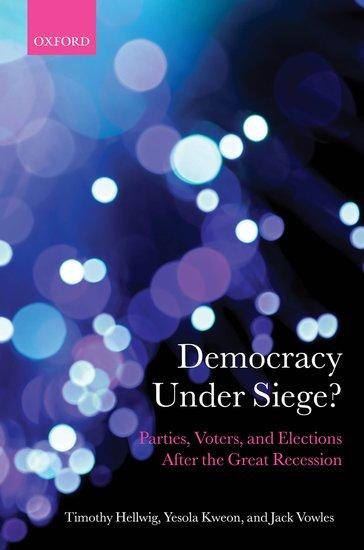
Democracy Under Siege? Parties, Voters, and Elections After the Great Recession
Volume Authors: Timothy Hellwig, Yesola Kweon, & Jack Vowles
Volume Citation: Hellwig, T., Kweon, Y., & Vowles, J., (2020). “Democracy Under Siege? Parties, Voters, and Elections after the Great Recession”. Oxford, UK: Oxford University Press.
Available online at Oxford University Press Scholarship.
Volume Description from OUP: “The Global Financial Crisis of 2008-2009 was catalyst for the most precipitous economic downturn in eight decades. This book examines how the GFC and ensuing Great Recession affected electoral politics in the world’s developed democracies. The initial wave of research on the crisis concluded it did little to change the established relationships between voters, parties, and elections. Yet nearly a decade since the initial shock, the political landscape has changed in many ways, the extent to which has not been fully explained by existing studies. Democracy Under Siege? pushes against the received wisdom by advancing a framework for understanding citizen attitudes, preferences, and behavior. It makes two central claims. First, while previous studies of the GFC tend to focus on an immediate impact of the crisis, Hellwig, Kweon, and Vowles argue that economic malaise has a long-lasting impact. In addition to economic shock, the economic recovery has a significant impact on citizens’ assessment of political elites. Second, the authors argue that unanticipated exogenous shocks like the GFC grants party elites an opening for political manoeuvre through public policy and rhetoric. As a result, political elites have a high degree of agency to shape public perceptions and behaviour. Political parties can strategically moderate citizens’ economic uncertainty, mobilise/demobilise voters, and alter individuals’ political preferences. By leveraging data from over 150,000 individuals across over 100 nationally-representative post-election surveys from the 1990s to 2017, this book shows how economic change during a tumultuous era affected economic perceptions, policy demands, political participation, and the vote.”
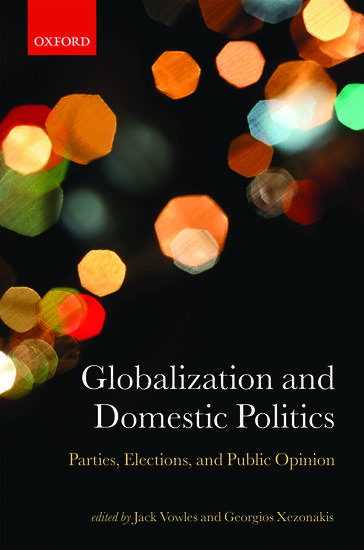
Globalization and Domestic Politics: Parties, Elections, and Public Opinion
Volume Editors: Jack Vowles & Georgios Xezonakis
Volume Contributors: Sarah Birch; Stephen D. Fisher; Timothy Hellwig; Jeffrey A. Karp; Mark Andreas Kayser; Caitlin Milazzo; Stratos Patrikios; Michael Peress; Kathrin Thomas; Erik Tillman; Jack Vowles; Georgios Xezonakis
Volume Citation: Vowles, J., Xenzonakis G., (Eds.) (2016). “Globalization and Domestic Politics: Parties, Elections, and Public Opinion”. Oxford, UK: Oxford University Press.
Available online at Oxford University Press Scholarship.
Chapters in book:
- Introduction: Globalisation and Domestic Politics, Jack Vowles and Georgios Xezonakis
- The Supply-Side of Electoral Politics: How Globalization Matters for Party Strategies, Tim Hellwig
- Globalization, Religiosity, and Vote Choice: An Empirical Test, Stratos Patrikios and Georgios Xezonakis
- Globalization, Positional and Valence Politics, and the Global Financial Crisis, Jack Vowles and Georgios Xezonakis
- The Buck Stops over There? Benchmarking Elections in the Open Economy, Mark Andreas Kayser and Michael Peress
- Has the Global Financial Crisis Changed Citizen Behavior? A Four-Country Study, Erik R. Tillman
- Does Globalization Weaken Accountability and Representation?, Stephen D. Fisher
- Globalization, Government Debt, Government Agency, and Political Efficacy: A Cross-National Comparison, Jack Vowles
- Globalization and the Quality of Elections, Sarah Birch
- Globalization and Voter Turnout in Times of Crisis, Jeffrey A. Karp and Caitlin Milazzo
- Democratic Support and Globalisation, Kathrin Thomas
- Conclusion, Georgios Xezonakis and Jack Vowles
Volume Description from OUP: “Globalization and Domestic Politics addresses how a widely acknowledged and pervasive economic and social process and globalization affect democratic politics among both masses and elites. It inquires into the extent to which, and how, globalization affects the political attitudes and behavior of ordinary citizens and the policies of political parties. Chapters discuss to what extent globalization affects the salience of left-right politics, the content of party programs and promises, leadership evaluations, economic voting, electoral accountability, the influence of religion in politics, electoral turnout, political efficacy, satisfaction with democracy, and the quality of democracy. It primarily draws on data from the Comparative Study of Electoral Systems (CSES), made up of three modules of election surveys from 44 countries and 107 elections.”
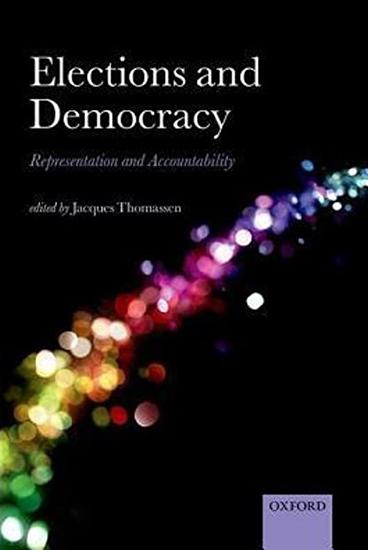
Elections and Democracy: Representation and Accountability
Volume Editor: Jacques Thomassen
Volume Contributors: Kees Aarts; Julian Bernauer; Diana Burlacu; André Blais; Eric Chang; Yun-han Chu; Harold Clarke; Russell Dalton; Delia Dumitrescu; Nathalie Giger; Sören Holmberg; Pedro C. Magalhães; Mark Peffley; Robert Rohrschneider; David Sanders; Hermann Schmitt; Shane Singh; Marianne Stewart; Jacques Thomassen; Gábor Tóka; Adrian Vatter; Carolien van Ham; Steven Weldon; Bernhard Wessels; Paul Whiteley; Wen-chin Wu;
Volume Citation: Thomassen. J., (Eds.) (2014). “Elections and Democracy; Representation and Accountability”. Oxford, UK: Oxford University Press.
Available online at Oxford University Press Scholarship.
Chapters in book:
- Representation and Accountability, Jacques Thomassen
- New Patterns of Democracy in the Countries of the Comparative Study of Electoral Systems 2. Julian Bernauer, Nathalie Giger, and Adrian Vatter
- Meaningful Choices: Does Parties’ Supply Matter? Bernhard Wessels and Hermann Schmitt
- Policy-based Voting and the Type of Democracy. Diana Burlacu and Gábor Tóka
- Political Institutions and the Social Anchoring of the Vote. Pedro C. Magalhães
- Political Institutions, Perceptions of Representation, and the Turnout Decision. André Blais, Shane Singh, and Delia Dumitrescu
- Democratic Structures and Democratic Participation: The Limits of Consensualism Theory. Steven Weldon and Russell Dalton
- Feeling Policy Represented. Sören Holmberg
- Output-oriented Legitimacy: Individual- and System-level Influences on Democracy Satisfaction. David Sanders, Harold Clarke, Marianne Stewart, and Paul Whiteley
- The Multiple Bases of Democratic Support: Procedural Representation and Governmental Outputs. Mark Peffley and Robert Rohrschneider
- Globalization, Representation, and Attitudes towards Democracy. Kees Aarts, Jacques Thomassen, and Carolien van Ham
- Consenting to Lose or Expecting to Win? Inter-temporal Changes in Voters’ Winner–Loser Status and Satisfaction with Democracy. Eric Chang, Yun-han Chu, and Wen-chin Wu
Volume Description from OUP: “This book addresses the contrast between the view that elections are a mechanism to hold government accountable and the view that they are a means to ensure that citizens’ views and interests are properly represented in the democratic process. The majoritarian and consensus models of democracy are the embodiment in institutional structures of these two different views of democracy. In the majoritarian view the single most important function of an election is the selection of a government. The concentration of power in the hands of an elected majority government makes it accountable to the people. In consensus models of democracy, or proportional systems, the major function of elections is to elect the members of parliament who together should be as representative as possible of the electorate as a whole. The criterion for the democratic quality of the system is how representative parliament really is. The book explores how far these different views and their embodiment in institutional structures influence vote choice, political participation, and satisfaction with the functioning of democracy. The volume is mainly based on data from the second module of the Comparative Study of Electoral Systems (CSES). The general conclusion of the book is that formal political institutions are less relevant for people’s attitudes and behaviour than often presumed. Rather than formal political institutions like the electoral system, it seems to be characteristics of the party system like polarization and the clarity of responsibility that really matter.”
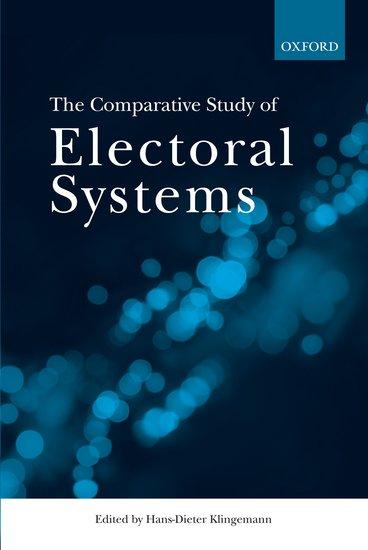
The Comparative Study of Electoral Systems
Volume Contributors: Bernt Aardal; Andrew Appleton; Susan A. Banducci; André Blais; John Curtice; Ingunn Opheim Ellis; Elisabeth Gidengil; Ashley Grosse; Thomas Gschwend; Sören Holmberg; David A. Howell; Jeffrey A. Karp; Hans Dieter Klingemann; Martin Kroh; Henk van der Kolk; Ola Listhaug; Karen Long Jusko; Ian McAllister; Richard Nadeau; Neil Nevitte; Yoshitaka Nishizawa; Hermann Schmitt; Phil Shively; Jacques Thomassen; Gabor Tóka; Bernhard Wessels;
Volume Citation: Klingemann H.D., (eds) (2012). “The Comparative Study of Electoral Systems”. Oxford, UK: Oxford University Press.
Available online at Oxford University Press.
Chapters in book:
- The Impact of Political Institutions, Hans-Dieter Klingemann
- ‘Big Social Science’ in Comparative Politics. Ashley Grosse and Andrew Appleton
- Methodological Challenges, David A. Howell and Karen Long Jusko
- Socio-economic Status and Non-voting, Neil Nevitte, Andre Blais, Elisabeth Gidengil, and Richard Nadeau
- Electoral Systems, Efficacy, and Voter Turnout, Susan A. Banducci and Jeffrey A. Karp
- Multiple Party Identifications, Hermann Schmitt
- Candidate Recognition in Different Electoral Systems, Soren Holmberg
- Who Represents Us Best? One Member or Many?, John Curtice and W. Phillips Shively
- Economic Voting, Yoshitaka Nishizawa
- The Ease of Ideological Voting, Martin Kro
- How Voters Cope With the Complexity of Their Political Environment, Hans-Dieter Klingemann and Bernhard Wessels.
- Expressive versus Instrumental Motivation of Turnout, Partisanship, and Political Learning, Gabor Toka
- District Magnitude and the Comparative Study of Strategic Voting, Thomas Gschwend
- Institutional Variation and Political Support: An Analysis of CSES Data from 29 Countries, Ola Listhaug, Bernt Aardal, and Ingunn OpheimEllis
- Effectiveness and Political Support in Old and New Democracies, Jacques Thomassen and Henk van der Kolk
Volume Description from OUP: “Citizens living in presidential or parliamentary systems face different political choices as do voters casting votes in elections governed by rules of proportional representation or plurality. Political commentators seem to know how such rules influence political behavior. They firmly believe, for example, that candidates running in plurality systems are better known and held more accountable to their constituencies than candidates competing in elections governed by proportional representation. However, such assertions rest on shaky ground simply because solid empirical knowledge to evaluate the impact of political institutions on individual political behavior is still lacking. The Comparative Study of Electoral Systems has collected data on political institutions and on individual political behavior and scrutinized it carefully. In line with common wisdom results of most analyses presented in this volume confirm that political institutions matter for individual political behavior but, contrary to what is widely believed, they do not matter much.”
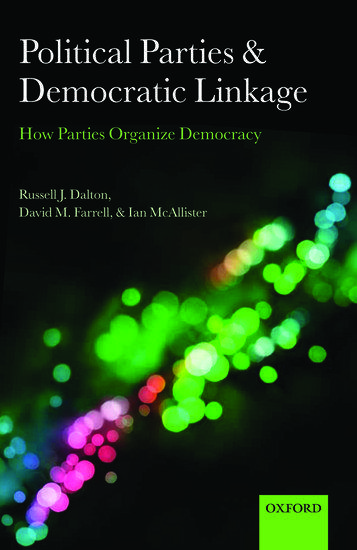
Political Parties and Democratic Linkage: How Parties Organize Democracy
Volume Authors: Russell J. Dalton, David M. Farrell, & Ian McAllister.
Volume Citation: Dalton, R.J., Farrell, D.M., & McAllister, I., (2011). “Political Parties and Democratic Linkage”. Oxford, UK: Oxford University Press.
Available online at Oxford University Press Scholarship.
Awarded the GESIS Klingemann Prize for best CSES Scholarship in 2012.
Volume Description from OUP: “Is the party over? Parties are the central institutions of representative democracy, but critics increasingly claim that parties are failing to perform their democratic functions. Political Parties and Democratic Linkage assembles unprecedented cross-national evidence to assess how parties link the individual citizen to the formation of governments and then to government policies. Using the Comparative Study of Electoral Systems and other recent cross-national data, the authors examine the workings of this party linkage process across established and new democracies. Political parties still dominate the electoral process in shaping the discourse of campaigns, the selection of candidates, and mobilizing citizens to vote. Equally striking, parties link citizen preferences to the choice of representatives, with strong congruence between voter and party Left/Right positions. These preferences are then translated in the formation of coalition governments and their policies. The authors argue that the critics of parties have overlooked the ability of political parties to adapt to changing conditions in order to perform their crucial linkage functions. As the context of politics and societies have changed, so too have political parties. Political Parties and Democratic Linkage argues that the process of party government is alive and well in most contemporary democracies.”
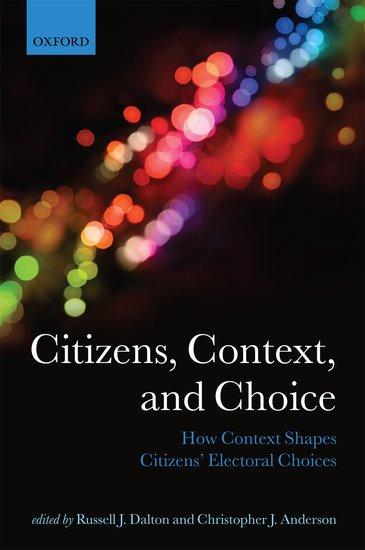
Citizen, Context, and Choice: How Context Shapes Citizens’ Electoral Choice
Volume Editors: Russell J. Dalton & Christopher J. Anderson
Volume Contributors: Christopher J. Anderson; Susan A. Banducci; Robin Best; Andre Blais; Russell J. Dalton; Timothy Hellwig; Jeffrey A. Karp; Miki Caul Kittilson; Michael D. McDonald; G. Bingham Powell Jnr.; Yulilya Tverdova.
Volume Citation: Dalton, R.J, & Anderson, C.J., (eds) (2010). “Citizen, Context, and Choice: How Context Shapes Citizens’ Electoral Choice”. Oxford, UK: Oxford University Press.
Available online at Oxford University Press Scholarship.
Chapters in book:
- Citizens, Context, and Choice, Russell J. Dalton and Christopher J. Anderson.
- Electoral Supply and Voter Turnout, Miki Caul Kittilson and Christopher J. Anderson.
- The Influence of Party and Electoral Systems on Campaign Engagement, Jeffrey A. Karp and Susan A. Banducci.
- The Role of Party Policy Positions in the Operation of Democracy, Robin Best and Michael D. McDonald.
- Left-Right Orientations, Context, and Voting Choices, Russell J. Dalton.
- Follow the Party or Follow the Leader? Candidate Evaluations, Party Evaluations and Macropolitical Context, Yuliya V. Tverdova.
- Context, Political Information, and Performance Voting, Timothy Hellwig.
- Strategic Defection Across Elections, Parties, and Voters, Andre Blais and Thomas Gschwend.
- Party Polarization and the Ideological Congruence of Governments, Bingham Powell.
- Electoral Supply, Median Voters, and Feelings of Representation in Democracies, Christopher J. Anderson.
- Nested Voters: Citizen Choices Embedded in Political Contexts, Christopher J. Anderson and Russell J. Dalton.
Volume Description from OUP: “A large body of electoral studies and political party research argues that the institutional context defines incentives that shape citizen participation and voting choice. With the unique resources of the Comparative Study of Electoral Systems, this book provides the first systematic evaluation of this topic. A distinguished international team of electoral scholars finds that the institutional context has only a modest impact on citizen political choices compared to individual level factors. Furthermore, the formal institutional characteristics of electoral systems that have been most emphasized by electoral studies researchers have less impact than characteristics of the party system that are separate from formal institutions. Advanced multi-level analyses demonstrate that contextual effects are more often indirect and interactive, and thus their effects are typically not apparent in single nation election studies. The results have the potential to reshape our understanding of how the institutional framework and context of election matters, and the limits of institutional design in shaping citizen electoral behavior.”
